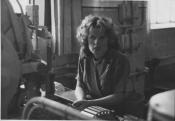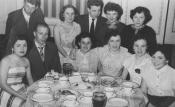Browse the interviews
Sorted by factory location
Cardiff: BSA Tools
VSE061 Gwynedd Lingard, BSA Tools, Cardiff
Gwynedd left grammar school at 16 (uncertain) (1950) to further her dreams of being a gymnast. She was selected for the Olympic team in 1952 – talks of the response of her area- flags and a street collection. She worked for Boots’ Chemist but they wouldn’t allow her time off so she went to work in the office in BSA Tools, which made scientific tools, microscopes etc. They gave her time off with pay. Her father built her a balancing beam in their lounge! Notes that when she went training in 1952 she had to take her own food coupons. Also the clothes rations and the cost of the uniform. Men on factory floor – wolf whistled when she went down there. She was the material control clerk, checking the stores and keeping the books. Men never offensive but they did ‘torment ‘ her. Describes a fatal accident in the furnace there. Dismal building – noise and smell. She left at 19 (1954) – she was pregnant. Accident on the way to work and taken to hospital by the boss. When a man pestered her (out of work) her boss sorted it out. Her father was a good swimmer and her mother a great runner and played baseball for Gripoly Mill though she didn’t work there. Later she went back to work, for the Gas Board (1972 until 1992). She talks about the Olympics in Helsinki and becoming an international coach.Cardiff: Currans
VSE032 Violet Ann Davies, JR Freeman's Cigar Factory, Cardiff;Currans, Cardiff
Ann left school at 15 (1955) and went straight into the cigar factory in Clive Street. The machines were dangerous – no guards. Singing and playing pranks. Smell of tobacco sticking to you. Names the girls she worked with. Got 200 cigarettes every month. Piecework. Describes processes. Making 3000-4000 cigars a day between two machines. Proud to be making King 60s and Indian Sticks. Company supportive when her mother was ill and when she had to take time off. Sick leave pay. Moved to new factory in 1960 – one big room. Radio and music. She left when pregnant in 1962 but returned on evening shift in 1963 but she became ill. Poverty and not having shoes to go out in. Tells story of Pat Perks – gymnast who competed in Commonwealth Games. Factory collected money to buy clothes etc for her. Ann worked part-time in Curran’s 1976-78- saucepan and baths factory. She worked on returns. Refused to work out in the yard. Her dad worked there during the war – terrible burns from boiling lead. Later she was a home carer for 23 years.
VSE057 Iris Radley, Currans, Cardiff
Iris worked in the Curran’s Factory as a summer holiday job when she was 16 (1956), although her mother was appalled because her father (who had worked in Curran’s during the war) said that factory girls were very common. The factory was making parts for tanks – heavy industry. She was told to wear an overall and a turban. Rhondda girls wore curlers under their turbans. She had to check the straightness of tank tracks (not skilled). Sitting down but physical job. She describes it. Crude jokes. She got her O Level results (through the Western Mail) when she was there. She had to pack bundles of rods and varnish labels. Story of the blind worker and his dog. Shock of working a week in hand. She wore very heavy duty rubber gloves. She was warned of one man who might harass her. She learned a lot there. Later she went on to finish her A Levels and to a career.VSE079 Madeline Sedgwick, Slumberland, Cardiff;Spillers and Bakers, Cardiff;Lionites Spectacles Cases, Cardiff;Currans, Cardiff
Madeline left school at 14 (1943). She talks of sheltering under Cardiff castle during air raids and the dangers. She worked as a hairdresser and then she started in Curran’s in 1948. They had a reputation for being racist. She talks of her experience with Littlewood’s. She worked in enamelling, making chamber pots (their handles) and mugs. She talks of different areas of Cardiff. She bought clothes and fish scrumps and went to dances with her own money. She only stayed there three months and she went to Spillers, on the flour and dog biscuits. They got a big machines and changed to working shifts. Rats. Small factory. Unloading grain from the ships downstairs. They wore turbans. She liked the sewing machine. Singing and talking. She left because of the shift work and moved to Slumberland – it was dusty there. She describes a visit to London. She describes her work and says that the company’s Paisley (Birmingham) workers were paid more than their Welsh ones. In winter her fingers would bleed from the fibres and the cold. She hit her leg and left. Then on to Fletcher’s but in the office – dressed smartly, answered the telephone and invoiced. She tells the story of challenging the boss of Slumberland about working until 6 on Fridays.Part of this interview is available as an audio file
Cardiff: Elkes Biscuits
VSE021 Doreen Lawson, JR Freeman's Cigar Factory, Cardiff;Elkes Biscuits, Cardiff;Avana Bakery, Cardiff
Doreen left school at 15 (1955) and worked in Littlewood’s café before going to Avana’s (1958)She put nuts on Dundee cakes first – wore overalls and turbans. Changed jobs, but difficult to keep up with conveyor belt! Saturdays she wore rollers under the turban – told to take them off. Ringleader for mischief. Talks about the foreign workers in the factory. Singing to radio. Cakes for M&S. Dancing and roller-skating in Cardiff. Pranks: dared to go down belt to loading bay; tying shoe laces. The men worked the ovens. Made 21st birthday party for her. Cakes half price. Left to get married 1961. Stayed 2 months at the Lyonite Factory, Canton making music boxes, but smell of glue. Back to Avana for 2 years. Worked a few months in laundries and then in Freeman’s.c. 1965-6.Working on hopper . She put the top leaf on the cigar then. Then pregnant and left (1968)If late lost her machine. In documentary about training in cigar factory. Afterwards she worked in a restaurant for 21 years. In Elke’s Biscuits for c. 8 months between Avana and Freeman’s. She tried to lead strike in Elke’s because of heat. In Avana someone lost a finger in the machine- put it back on. Enjoyed in the factories.Cardiff: Garment factory
VSE071 Veronica (Vera) Diane Lena Battle, JR Freeman's Cigar Factory, Cardiff;Ralph Mathers garment factory, Cardiff;Garment factory, Cardiff
Vera’s father was a renowned jazz musician – she outlines her background and his career. Vera left school at 14 (1948) and started in the sewing factory, sewing buttons and canvas in the lapels of men’s jackets. She moved to the cigar factory in Clive Street, annual trip to London. She took the cigars down the cellar and stacked them to dry out. Because the factory moved to Penarth Road she went to work in a tailoring factory making women’s clothes. She was on the overlocker and the buttonholes. They sang. There were a lot of Greek girls there. They were the best tailors She names some of the workers. She had clothes made for her daughters there. She moved to Toulouse with her prospective husband but returned and he went back to America. She was also a dancer who performed in the chorus of an American Negro show and on tour (London and Scotland etc.). She has worked in a primary school too.Cardiff: Glass factory
VSE070 Michele Ryan, Glass factory, Cardiff
Michele worked in the factory during her first year at university (c.1969-70). It was winter and it was a brick shed with lots of broken glass windows. She wore gloves to move the huge plates of glass around the factory. A desire to be part of working class life. The women (30-40% of workforce) had ways of managing the place and the men there. She notes that Cardiff in the 1960s was an industrial and manufacturing town. The women were Bolshie – she describes one young man being initiated into work (pinching and grabbing etc.). Ensured that they wouldn’t be messed about. Different jobs for men and women. She felt the women weren’t allowed on the machines – more money for this. While in University, as a left wing feminist, she sold Women’s Voice and the Socialist Worker outside the Baird’s TV Factory in Bradford. After the war the women invested a lot in keeping men’s pride going – women accepted their lot. Crude facilities. She stayed there a few weeks. Some sense of belonging there. She notes the women’s bitchiness but also their generosity and collective support. Not very politicised in the Cardiff factory.Cardiff: Horrock's
VSE001 Rita Spinola (nee Stevens), Mr Spencer's leather factory, Cardiff;Horrock's, Cardiff
Rita left school at 15 (1954) and worked in a laundry while waiting for a vacancy at Horrock’s. First task – hand sewing; then machinist - making part of garment. They made lovely circular dresses and dressing gowns. Social life; radio and singing; Cutters and packers were women too. Factory closed c.1958/9. Attitude to factory work. Sales of other Horrock’s products too. Union – temperature at factory. Needle through finger. Lorna Leslie (singer - stage name Irene Spetti, David Dickinson’s wife) worked there. Moved to leather factory – 2/3 machinists making school satchels etc. Oiling machines – got impetigo, lack of hygiene and no facilities. No fun there. Stayed there 18 months and then went to Germany with her husband. She became pregnant. Returned and she worked in St Paul’s school as a dinner lady for 38 years.
